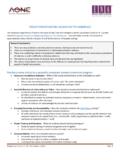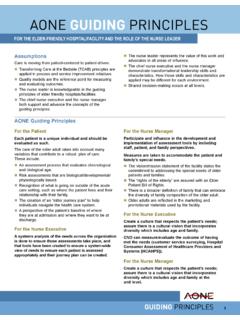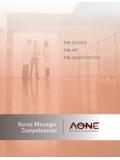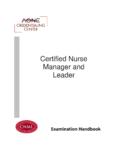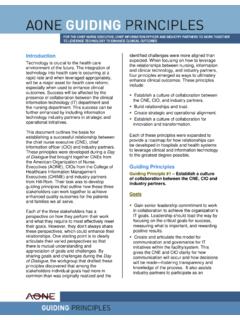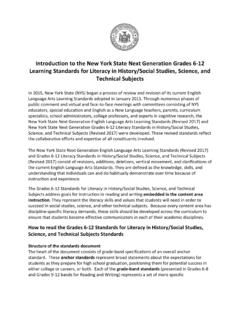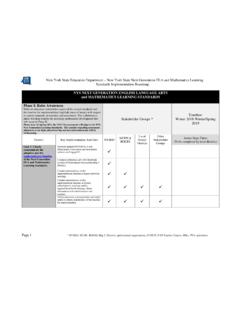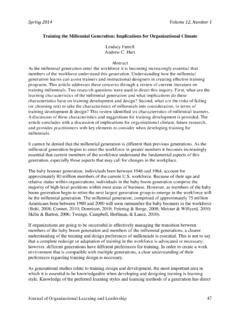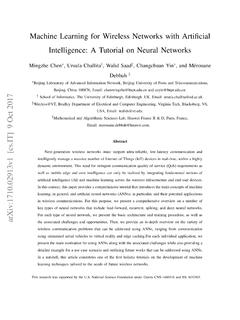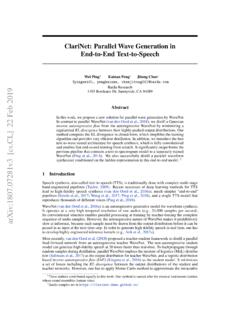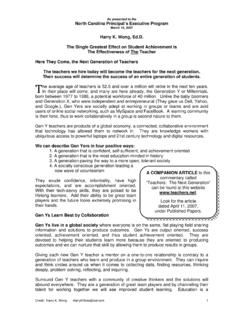Transcription of AONE Guiding Principles for Creating Value and Meaning …
1 AONE Guiding Principles FOR Creating Value AND Meaning FOR THE next . generation OF early careerist . Introduction Nurse leaders provide the vital link between the administrative strategic plan and the point of care. They are responsible for Creating safe, healthy environments that support the work of the health care team and contribute to patient engagement. Nurse leaders' proactive behavior can mean the difference between medical mishaps and the development of innovative care delivery models. Assumptions Nurse leaders in formal manager positions lead complex patient care areas.
2 Organizations should continuously monitor formal nurse leader retention, turnover and vacancy rates. The evidence suggests that although nurses in formal leadership roles may be satisfied with their roles, role overload leads to stress and many opt to leave their positions. Studies suggest the average tenure of nurse managers is five years. Nurse leader succession planning is critical to ensuring stable, healthy work environments for nurses. The evidence supports that it is increasingly difficult to recruit new nurses into formal leadership positions.
3 Factors affecting successful recruitment include organizational culture, professional growth, scope of responsibility, and recognition. Multiple generations comprise the current workforce; each generation is motivated differently and brings unique traits, work ethic, and skills to their position. Expectations of early Careerists The early careerist shares equal responsibility and accountability for his or her own professional development by: Promoting an environment which keeps the focus on the patient. Sharing expertise and time to contribute to and support the organization's mission.
4 Developing and openly sharing career and personal goals, and aspirations with direct supervisor. Leveraging resources provided by the organization to help achieve personal and career goals. Recognizing that emotional intelligence is central to effective leadership. Understanding cross generational attributes; including one's own cohort group. Guiding Principles The Guiding Principles are based on the ACORN imperatives (Acknowledge, Create, Operate, Respect, Nourish). developed by Zemke, Raines, and Filipczak (2013) to recognize the challenges facing the multigenerational workforce and to help organizations have strong and sustainable outcomes, high productivity, and satisfied stakeholders.
5 Acknowledge generational differences and integrate them into organizational goals and outcomes Acknowledge generational differences and personal preferences for communication, learning, feedback, and management and leadership. Suggested Actions: - Include nurse managers in strategic planning - Align resources to support organizational priorities - Align resources to assure managerial effectiveness Create choices which promote harmony between career and personal life Allow the workplace to shape itself around the work being done, the customers being served, and the people who work there.
6 Suggested Actions: - Creative scheduling options - Innovative management options: - Job sharing/co-management - Option to work remotely - Self-leadership - Negotiated time to work clinically (if this is of interest to the manager). - Benefit time programs that provide flexibility - Resources and options that support and foster wellness - Resources and options that support professional and personal obligations: - On-site daycare - Concierge services - Financial Aid/Tuition assistance Operate from a sophisticated management style Administrative leaders create a collaborative culture that supports safe patient care, managerial effectiveness, and focuses on outcomes rather than structure and process.
7 The chain of command is shortened and the ultimate goal is to decrease bureaucracy. Suggested Actions: - Foster accountability across disciplines - Foster collegiality across disciplines focusing on nurse-provider relationships - Foster leadership styles based on personal traits that achieve outcomes - Include generational differences in diversity training - Support proactive strategies in response to forecasted needs - Provide quality improvement resources and meaningful data that support tactical actions; follow trends/patterns not individual data points - Promote interprofessional management governance Respect competence and initiative Accepting generational level of management provides managers an opportunity for growth and lifelong learning.
8 Suggested Actions: - Support autonomy in practice - Assume the best in people - Promote and facilitate an environment where generational expertise is valued - Collaborate to identify unit priorities and initiatives - Strengths-based leadership - Encourage independent problem solving and elicit innovative ideas - Support certification initiatives - Encourage networking with colleagues within and external to the organization Nourish retention Maximize the elements of nurse manager engagement and minimize the barriers to retention through
9 Evidence- based generational leadership practices. Suggested Actions: - Align compensation to outcomes and contribution - Use of evidence in determining span of control - Include nurse managers in hospital level committee work - Provide adequate resources and time to manage care processes, staff engagement and patient and family engagement on assigned units Administrative support Competent off shift leaders with authority Efficient and effective organization processes Meaningful meetings Formalized training in coaching and mentoring - Foster professional development and socialization Nurse manager onboarding/residency program - Formalized mentoring program - Foster a broader understanding of organization structure and operation.
10 - Create a career management framework that builds skills, knowledge, and experience - Foster an environment that promotes job enjoyment and meaningful work References Cadmus, E., Wisniewska, E. (2013). Measuring first-line nurse manager work. Journal of Nursing Administration, 43, 673-679. Kath, L. M., Stichler, J. F., & Ehrhart, M. G. (2012). Moderators of the negative outcomes of nurse manager stress. Journal of Nursing Administration, 42(4), 215-221. Keys, Y. (2014). Looking ahead to our next generation of nurse leaders: generation X Nurse Managers.

